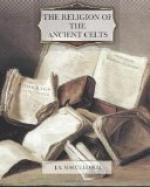Dio Chrysostom alleges that kings were ministers of the Druids, and could do nothing without them.[1046] This agrees on the whole with the witness of Irish texts. Druids always accompany the king, and have great influence over him. According to a passage in the Tain, “the men of Ulster must not speak before the king, the king must not speak before his Druid,” and even Conchobar was silent until the Druid Cathbad had spoken.[1047] This power, resembling that of many other priesthoods, must have helped to balance that of the warrior class, and it is the more credible when we recall the fact that the Druids claimed to have made the universe.[1048] The priest-kingship may have been an old Celtic institution, and this would explain why, once the offices were separated, priests had or claimed so much political power.
That political power must have been enhanced by their position as teachers, and it is safe to say that submission to their powers was inculcated by them. Both in Gaul and in Ireland they taught others than those who intended to become Druids.[1049] As has been seen, their teachings were not written down, but transmitted orally. They taught immortality, believing that thus men would be roused to valour, buttressing patriotism with dogma. They also imparted “many things regarding the stars and their motions, the extent of the universe and the earth, the nature of things, and the power and might of the immortal gods.” Strabo also speaks of their teaching in moral science.[1050] As has been seen, it is easy to exaggerate all this. Their astronomy was probably of a humble kind and mingled with astrology; their natural philosophy a mass of cosmogonic myths and speculations; their theology was rather mythology; their moral philosophy a series of maxims such as are found in all barbaric communities. Their medical lore, to judge from what Pliny says, was largely magical. Some Druids, e.g. in the south of Gaul, may have had access to classical learning, and Caesar speaks of the use of Greek characters among them. This could hardly have been general, and in any case must have superseded the use of a native script, to which the use of ogams in Ireland, and perhaps also in Gaul, was supplementary. The Irish Druids may have had written books, for King Loegaire desired that S. Patrick’s books and those of the Druids should be submitted to the ordeal by water as a test of their owners’ claims.[1051]
In religious affairs the Druids were supreme, since they alone “knew the gods and divinities of heaven."[1052] They superintended and arranged all rites and attended to “public and private sacrifices,” and “no sacrifice was complete without the intervention of a Druid."[1053] The dark and cruel rites of the Druids struck the Romans with horror, and they form a curious contrast to their alleged “philosophy.” They used divination and had regular formulae of incantation as well as ritual acts by which they looked into the future.[1054] Before all matters of importance, especially before warlike expeditions, their advice was sought because they could scan the future.




